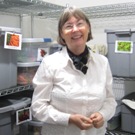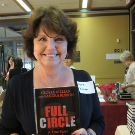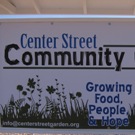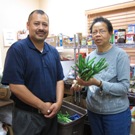Part 2: Meet the People. Challenges, Solutions & Funding Interviews
Last Month’s Newsletter
In last month’s newsletter—
Nonprofit Interviews: Challenges, Solutions & Funding—I wrote about 16 non profit organizations that I interviewed in California. I wanted to see firsthand what challenges this range of nonprofits was facing and what goals they were hoping to achieve over the next 12 months. I published a detailed list of the results in the newsletter.
I did this because I wanted to make sure that our September training workshop—
Designing and Funding Non Profit Programs—will maintain an updated and current step-by-step process in helping them reach their goals.
In this month’s pair of newsletters I want to introduce you to the people and the organizations that I spoke to. This is
Part Two: organizations working with community development, social justice, education and social services. In last week’s
Part One I introduced you to organizations working with food and hunger.
These people are representative of the people you will meet if you attend the September workshop in Claremont, California. Click on the links below to learn more about these wonderful organizations. They are the best of the best!
| Claremont | Sustainable Claremont |
 | Sustainable Claremont is a non-profit 501(c)3 organization which was formed to provide educational resources, to engage in advocacy, and to take actions which move us towards sustainability, not only within Claremont but beyond our borders. We are independent of the City but work in cooperation with it and with other organizations. |
I met with Sustainable Claremont’s coordinator Alexis Reyes in May. She described how they run projects through Action Groups. One of her major goals this year is to reduce energy use citywide through their 2-year Claremont Energy Challenge.
| Claremont | |
 | Executive Director Nancy Mintie in their urban agriculture food storage locker. At Uncommon Good we believe that we are part of a global community that is responsible for building healthy families, healthy communities, and a healthy planet. Their Connect to College Mentoring Program is designed to inspire at-risk, low income children to stay in school, go to college and break the cycle of poverty. Their MED Relief Program supports idealistic young doctors, dentists, optometrists, and pharmacists who serve in community clinics in low income communities |
Through their Urban Agriculture Program, Fiddleneck Family Farms, unemployed immigrants with farming expertise, whose children are in our program, are employed raising organic fruits and vegetables for the Los Angeles County and San Bernardino County markets. Their Teen Green Program is a youth-led environmental group made up of students from the Connect to College Mentoring Program.
| Claremont | |
 | Executive Director Gloria Killian. Action Committee For Women In Prison.Our mission is to advocate for the humane and compassionate treatment of all incarcerated women everywhere. We work for the release of all women who are unjustly imprisoned, and strive to reduce the over reliance on incarceration. We work to bring fairness and equity into the criminal justice system and to shift the focus to treatment and restorative justice. We work to educate the public, develop new legislation, implement new programs, and develop resources for incarcerated women. It is our vision that all persons who are impacted by the criminal justice system will be treated with dignity and respect, and that restorative justice will be the goal of all parties. |
Their Annual Christmas Project: Christmas packages to 5,000 women in prison in California. For the past 11 years, The Action Committee for Women in Prison and All Saints Church Episcopal Church have joined together to provide small gift bags for the 2,500 women imprisoned at the California Institution for Women. These gift bags are the only holiday gifts that women in prison receive. This year we are delighted to announce that ACWIP is partnering with the Los Angeles County Sheriff’s Department to include the 2500 women incarcerated in the Los Angeles County Jail System, for a total of 5,000 gift bags for incarcerated women.
| Pomona | |
 | Pomona Hope’s programs include an after-school program for kids in first through twelfth grade. Each day includes a snack and recreation time, homework/reading time, customized tutoring in Math and Language Arts, Gym Games, and Computers or Art time. Their Arts Program fosters self-expression and community growth through the visual and performing arts. Other programs include parent and skill building, internships and job training, community organizing and a community center. Executive Director Emily Budiyanto has goals for this year for increasing staffing to include a volunteer coordinator and a parent liason. |
In 2010 Pomona Hope leased an empty lot across the street from the Community Center of the First Presbyterian Church of Pomona for a Community Garden. In 2011 the garden was dedicated to the neighborhood as the Center Street Community Garden. The 1/3 acre garden has 51 garden plots; 1/2 of the participating families are from the immediate neighborhood. Barbara provides classes on food and gardening for kindergarten students through 8th grade. She has been successful in getting annual supplies donated from corporations like Home Depot.
| Pomona | |
 | Inland Valley Hope Partners believes in feeding the hungry and sheltering the homeless—and they serve people in a dozen cities. They run four food banks, provide emergency housing—and run a farmers’ market and a gleaning program where backyard gardeners can donate extra vegetable production to Hope Partners clients. |
Hope Partners’ Director of Development and Communication, Kami Newman, feels that a major goal is to help move people forward to independence. She also feels that quantifying program impact is important and recommends an impact measurement system developed by United way. When we met in May she was just completing the final details for a fundraising golf tournament with 144 golfers!
September Program Information
In this blended learning, three week training program you will participate in:
PHASE I: Three weeks.
- 2 weeks pre-workshop. Guided Field Data Collection: Community Needs Assessments. Conduct a needs assessment with a community where you work in preparation for use in the workshop—guided through distance learning by CSDi staff. We will provide all of the tools and information you need to conduct the needs assessments.
- 2 optional field days. Don’t have community access? Participate in two optional field days the Saturday and Sunday prior to the workshop conducting a participatory needs assessment with our local partner near the workshop venue.
- 5 days. A Face-to-Face Workshop. Full Project Design and Development. Working with the CSDi workshop leader, you will use your needs assessment to begin the development of a complete, fundable, launchable project.
We look forward to working with you in our training programs.
Sincerely,
Tim Magee, Executive Director
Center for Sustainable Development
Would you like to
subscribe to this newsletter?




